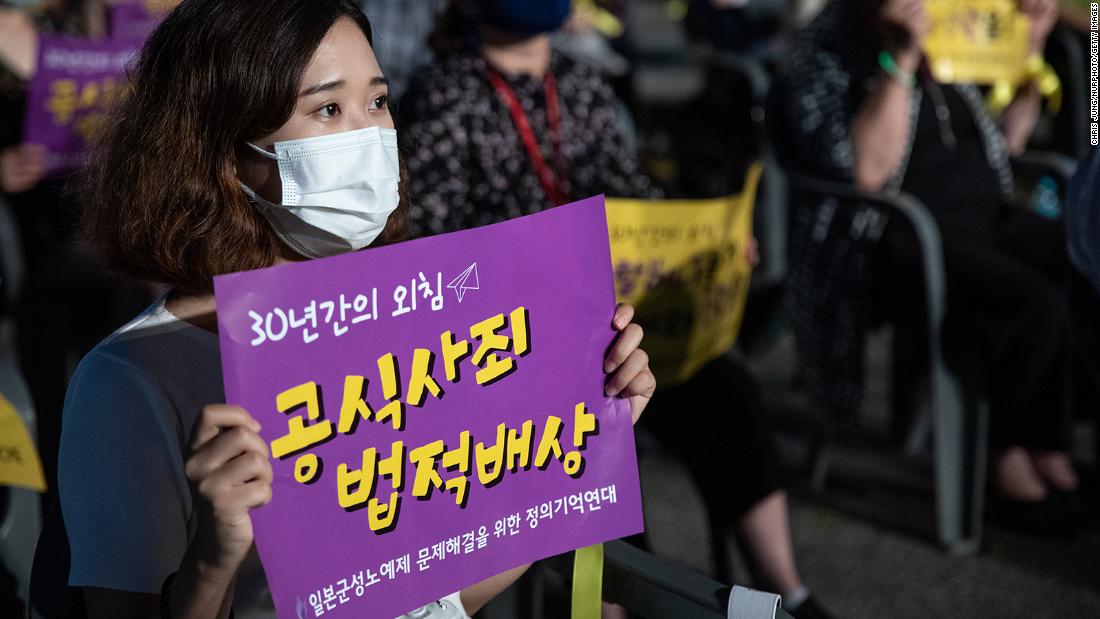
The victims sued the Japanese government in 2016 for kidnapping, sexual assault and torture during World War II. They were in their teens and early twenties during the Japanese occupation of the Korean peninsula, and were subjected to dozens of forced sexual acts by Japanese forces every day, the judge said in Friday’s ruling.
These girls and women forced into sexual slavery are known as ‘comfort women’. The practice was sanctioned and organized by the Japanese Imperial Army before and during World War II.
The Japanese occupation ended in 1945, but the victims suffered great psychological trauma and pervasive social stigma in the years after the war, the judge said. The judge awarded the full $ 91,000 (100 million won) that the plaintiffs had asked for, adding that the damages they had suffered exceeded that amount.
Japanese Prime Ministers have apologized in the past, and Tokyo believed the issue was resolved in 1965 as part of an agreement to normalize relations between the two countries. But South Korea was a military dictatorship at the time, and many Koreans argue the deal was unfair.
Another milestone in 2015 was a new apology and an $ 8 million pledge to a foundation to support the surviving “comfort women.”
Despite these existing arrangements, plaintiffs had the right to seek damages, the judge said Friday.
In a statement following the ruling, South Korea’s Foreign Ministry said the government “respects the court ruling and will do everything in its power to restore the honor and dignity of the victims of ‘comfort women’.”
It acknowledged the 2015 agreement between the countries and said the government would also “review the impact of the ruling on diplomatic relations and make every effort to continue constructive and forward-looking cooperation between Korea and Japan”.
However, Japanese officials sharply criticized the ruling, with Cabinet Secretary Katsunobu Kato calling it “extremely regrettable” and “absolutely unacceptable,” according to a Reuters feed from Friday’s press conference.
Kato added that the Japanese government was not under South Korean jurisdiction and that the country had repeatedly called for the case to be dropped. “We strongly demand that South Korea as a country take an appropriate response to correct this violation of international law,” he said.
Korea’s Comfort Women
“A large number of the female victims speak of violence against family members who tried to prevent the kidnapping of their daughters and, in some cases, of rape by soldiers in front of their parents before they were forcibly taken away,” the report said. .
Despite Japan’s apologies and compensation, South Korean activists say the apology did not go far enough and many are demanding further reparations.
“As victims of the great suffering of Japanese imperialism in the past, we for our part cannot fail to take Japan’s continued economic retaliation very seriously,” South Korean President Moon Jae-in said after the economic retaliation. “It is all the more so because this economic retaliation is unjustifiable in itself and has its roots in historical issues.”
Historical hostility is also felt among many civilians; More than 36,000 South Koreans signed a petition during the 2019 trade dispute calling on the government to retaliate against Tokyo. Many South Koreans also called for a boycott of Japanese products on social media.
“The Rising Sun flag is akin to a symbol of the devil for Asians and Koreans, just as the swastika is a symbol of Nazis reminding Europeans of invasion and horror,” said An Min-suk, the chair of the parliamentary committee for sport.
But Olympic organizers refused to ban the flag from competition venues, arguing that “the flag itself is not considered a political statement.”

